The fact that Trump wants to dismantle the liberal world order has obscured the more important question of whether he can, writes James Kirchick. This piece originally appeared in Foreign Policy.
Following a weeklong European tour during which he disparaged America’s closest allies and flattered its greatest adversary, there no longer can be any doubt that U.S. President Donald Trump wants to dismantle the liberal world order. That order—a system of multilateral arrangements, alliances, and institutions—was built in the ashes of World War II under U.S. tutelage and strength of arms. It extends from the European Union and NATO to the long-standing security guarantees Washington has established with Asian countries such as Japan and South Korea. The resulting Pax Americana laid the groundwork for the greatest period of peace and prosperity in human history.
Such has been the U.S. political consensus on NATO that, since the alliance’s creation in 1949, criticizing America’s membership was akin to advocating the abolition of child labor laws: It simply wasn’t done by serious candidates seeking the presidency. Trump changed all that.
Among the many taboos he broke during the 2016 U.S. presidential election, Trump went so far as to call NATO “obsolete,” and since taking office, he has repeatedly questioned America’s security commitment to treaty allies.
Although U.S. presidents of both parties since Harry Truman have supported the political and economic integration of Europe, Trump supported the United Kingdom’s decision to leave the EU.
And after having campaigned as the most pro-Russia candidate since Henry Wallace, it was fitting that Trump would utterly abase himself before President Vladimir Putin at their joint press conference in Helsinki. When Trump validated Putin’s denials of election meddling, not only did he endorse the Russian autocrat’s lies over the unanimous assessment of U.S. intelligence agencies and senior congressional leaders of his own Republican Party, but he also obfuscated how Russia is hostile to U.S. interests, values, and alliances.
But the fact that Trump wants to dismantle the liberal world order has obscured the more important question of whether he can. According to Stewart Patrick, the order is already unraveling. “In 18 short months, he has torn at the roots and hacked at the branches of Western solidarity that his predecessors painstakingly cultivated over seven decades,” he writes in Foreign Policy. U.S. allies, he says, are “pursuing strategic autonomy,” “working with China to safeguard globalization,” and “grasping to defend what remains of the open world from the depredations of its erstwhile creator.” And with “U.S. abdication of global leadership,” the European Union stands as “the best hope for liberal internationalists.”
Patrick is right about Trump’s intentions. But like many analysts prematurely mourning the downfall of the liberal international order, he writes as if the president of the United States acts unconstrained by Congress or even his own administration. Were Trump to exist in a different political system, one with fewer checks and balances and external limitations on a leader’s power, he would be far more dangerous. Trump’s behavior as a businessman, his authoritarian rhetoric, and his frequently expressed admiration for strongmen suggest dictatorial tendencies.
But as Trump would probably be the first to admit, running a democratic country—with a free media, independent judiciary, active civil society, energized opposition party, and regular elections—isn’t at all like running a family business. If Trump were president of a banana republic like Venezuela, or a nonconsolidated democracy like Hungary, it would be much easier for him to single-handedly undermine his country’s democratic institutions and geopolitically reorient it away from the free world. Fortunately, Trump—however despotic his inclinations—is the democratically elected leader of the world’s oldest constitutional republic, and his attempts to undo the seven-decade-old liberal world order that republic built and sustained have thus far largely been frustrated.
The primary reason for this is that, at least in the realm of foreign and defense policy, Trump has either been unwilling or unable to staff his administration with like-minded “America First” nationalists. The U.S. diplomatic and security apparatus is a behemoth, comprising tens of thousands of people, and it requires a great number of ideologically committed and bureaucratically skilled individuals to transform America’s world role in the way Trump desires. Beginning with Defense Secretary James Mattis, Secretary of State Mike Pompeo, National Security Advisor John Bolton, and continuing further down the bureaucratic chain to Wess Mitchell, the assistant secretary of state for European and Eurasian affairs, and Fiona Hill, the National Security Council senior director for European and Russian affairs, there is no one in the upper echelons of the U.S. diplomatic and military firmament who even remotely shares the president’s antipathy to the EU, NATO, or U.S. global leadership, never mind his bizarre affinity for Putin. (The role of these patriotic officials in restraining Trump’s worst impulses, and the likelihood of their replacement by incompetent and obsequious ideologues, makes the recurring calls for them to resign shortsighted.) Until he was fired last summer, Steve Bannon was the closest thing Trump had to an advisor capable of translating his gut prejudices, conspiratorial delusions, and half-baked proposals about the world into actual policies. For a taste of the damage Bannon might have wreaked were he still in the White House, look to Brussels, where he has decamped to set up a nationalist political network he claims will rival George Soros’s Open Society Foundations.
Absent Bannon whispering in his ear, Trump’s ability to wreck the liberal world order hinges upon the degree to which he can translate his nationalistic, zero-sum worldview into actions on the world stage. Thus far, the damage he has done is mostly rhetorical. And nowhere has the gap between wild presidential rhetoric and actual governmental deeds been more apparent than Russia. The media’s obsessive coverage of the Trump-Putin summit as if it were a major title boxing match—with television news outlets dispatching entire teams to Helsinki for nonstop coverage—exemplifies its simplistic reduction of U.S.-Russia relations to mere personalities and is seriously distorting analysis. For all the talk of Trump’s “treasonous” behavior last week (and it was indeed morally despicable), there were no actual U.S. policy concessions to Russia as a result of his disastrous performance. From expulsions of Russian diplomats to sanctions on Russian individuals and entities to Ukrainian arms sales and increased support for—yes— NATO, the posture of the United States toward Russia is tougher than it has ever been since the end of the Cold War. “Trump and the U.S. are not exactly the same thing right now,” a person close to a Russian business tycoon recently lamented to the Financial Times, with more than a little understatement.
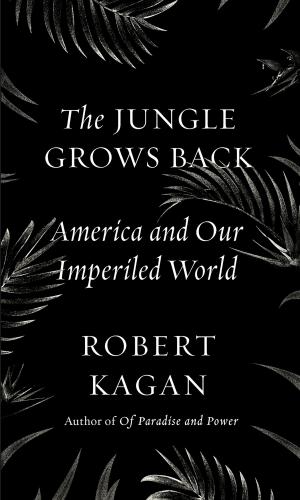

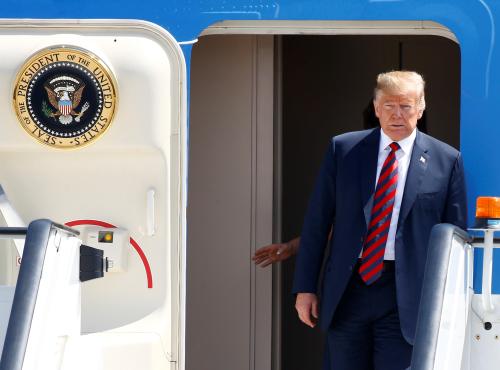
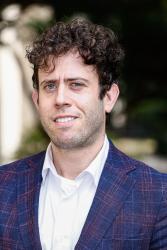
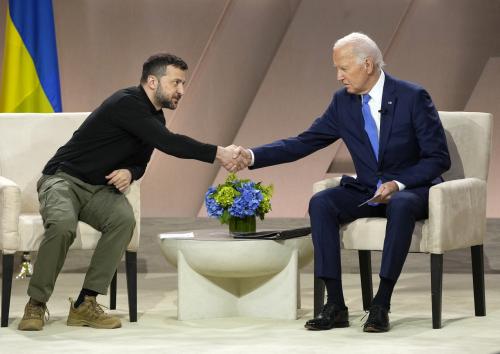
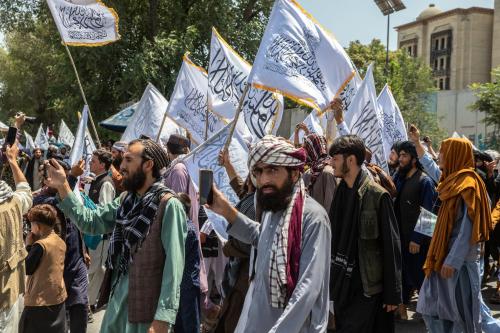
Commentary
Trump wants to destroy the world order. So what?
July 27, 2018